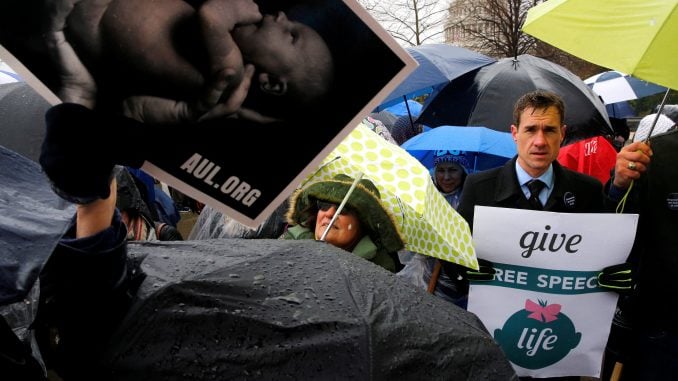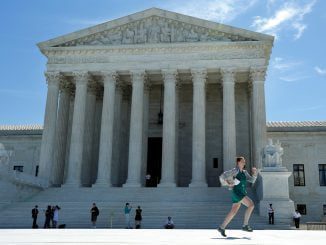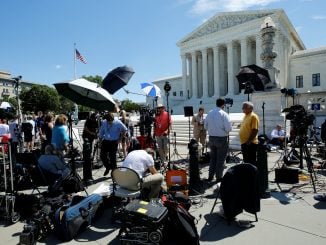
Washington, D.C. — The Pregnancy Care Clinic in the Southern California city of El Cajon offers a host of services for pregnant women including ultrasound exams, prenatal vitamins and maternity clothes. There is one major exception: abortion.
Now the clinic, which staunchly opposes abortion, is among a group of Christian-based facilities, known as crisis pregnancy centers, involved in a major case that went before the U.S. Supreme Court on Tuesday.
They are challenging a California law that forces centers that are licensed as family planning facilities to post notices that the state has programs offering free or low-cost birth control and abortion services, a requirement they argue violates their free speech rights under the U.S. Constitution’s First Amendment. The law requires unlicensed facilities with no medical provider on staff to disclose that fact.
“They’re forcing us to use our walls as a billboard to promote abortion,” Pregnancy Care Clinic executive director Josh McClure said in an interview. McClure, whose facility is licensed, compared California’s law to forcing the American Lung Association to tell people where to buy cigarettes.
California said in legal papers some of these centers try to prevent women from accessing abortions by using incomplete or false medical advice. Some try to resemble medical clinics down to lab coats worn by staff, giving the impression they offer abortion services while employing no actual medical professionals, California said.
The centers say they offer legitimate services and that their mission is to persuade women to forego abortion.
“A victory in each of these cases would signal that there are … situations where a free speech claim might prevail against the government that might not have 20 years ago,” said attorney Ken Klukowski of the First Liberty Institute, a conservative legal group.
California’s Reproductive FACT Act was passed by a Democratic-led legislature in 2015 and signed by Democratic Gov. Jerry Brown. The San Francisco-based 9th U.S. Circuit Court of Appeals upheld it in 2016, finding it did not discriminate based on viewpoint. The pregnancy centers appealed that ruling to the Supreme Court. Attorney Kristen Waggoner of the conservative legal group Alliance Defending Freedom, which represents the centers, said the law targets only these facilities. “Pointing the way to abortion is a violation of conscience,” Waggoner added.
The El Cajon facility serves about 800 clients annually and has medical staff including doctors and nurses. It calls itself a “front line ministry” supported by churches and other donors, offering Bible study for clients and opportunities for volunteers to spread the gospel to visitors to the facility. Its website address, unplannedparenthood.org, resembles Planned Parenthood, which provides health care services and abortions in clinics around the country. McClure said his facility’s name was chosen because most clients have unplanned pregnancies.
Adrienne Kimmell, a vice president at the abortion rights group NARAL, said the name was not coincidental, adding, “Almost all of these places have names that are really confusing and they’re usually in the same city block as other centers that actually do provide a full range of reproductive health care options.”
Regarding abortion, McClure said, “We are very upfront that it is not a service we are going to provide.”
Waggoner said the clinic’s website is accurate and California has presented no evidence of actual deception or confusion.




